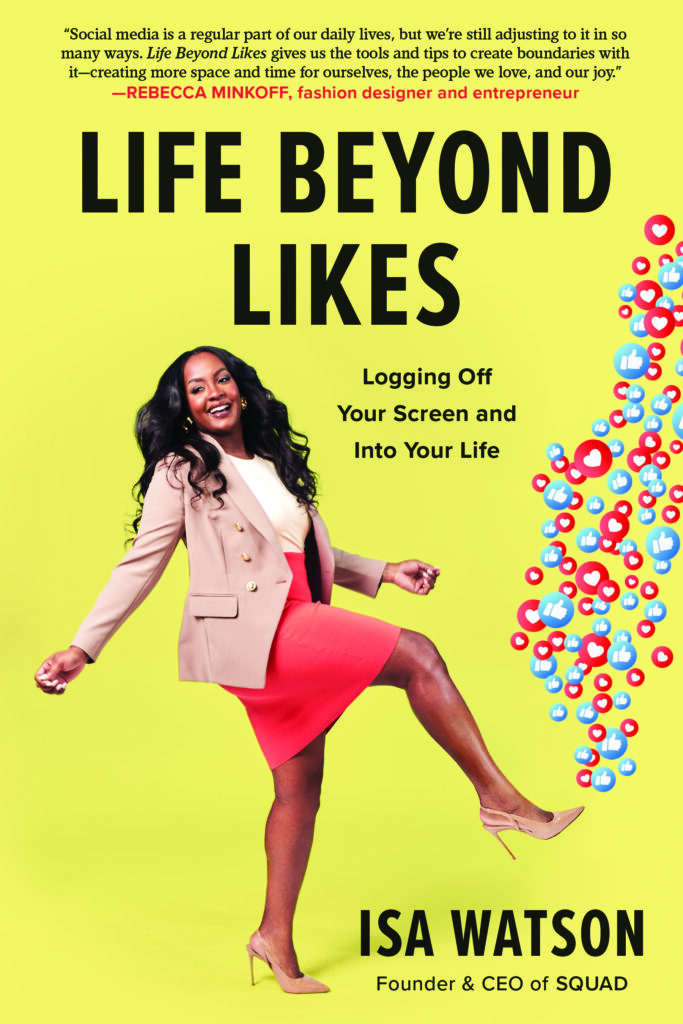Balancing the roles of an entrepreneur, visionary, and thought leader often entails being tethered to social media. That’s why digital detoxing is a vital part of Isa Watson’s regimen.
Challenging fabricated social media standards is something the award-winning founder and CEO of Squad, a voice-only social experience for sports fans, prides herself on. But it wasn’t always this way. Watson’s rigorous ethic manifested early on in her career—holding roles from an organic chemistry researcher at UNC Chapel Hill to working on Wall Street for JP Morgan Chase. The grind led her to become fixated with perfecting her online persona, often at the expense of quality time with loved ones. The tragic wake-up call of losing her father in a bus accident prompted Watson to reevaluate how she was investing her time and prioritize what truly mattered.
“It was at that level of darkness that I went through for the mere fact that I wasn’t engaging or investing in my real life, and it was just a horrible place to be,” says Watson.
The harsh truths of unhealthy digital connectivity is the central focus of Watson’s inaugural book, Life Beyond Likes: Logging Off Your Screen And Into Your Life. The research for her book would later inspire a fresh approach for her venture-backed social platform, Squad, which is hyper focused on cutting through internet exploitation to build authentic relationships through shared interests in sports.


Watson shared with Sweet July her personal struggle with navigating an online presence. She also offers practical guidance for readers seeking to break free from poor social media habits and embrace their true selves.
You’re coming up on your one-year anniversary of publishing this debut novel. How has life been for you since your book hit the shelves?
Isa Watson: It feels surreal. I get direct messages every day from people who’ve read the book who said it’s completely changed their life. I’ve gotten testimonials about how it’s changed how they spend time and operate online. They are thinking and learning how to validate themselves.
What does digital well-being mean for you? How can someone actively work towards that in their daily lives?
IW: It’s balance and intentionality: We live in a society that rewards people with doing more with less. The thing about that is that we haven’t been discussing the habits we create. For me, the balance side of things is that I try not to get on social media within an hour of waking up and within an hour of going to bed because we are our most vulnerable at those hours. Intentionality is the underpinning theme of the book. I define it as using the potential of our mind and the power of actions to live a life rooted in joy.
Do you believe there’s a need for increased awareness and education on the harmful side-effects of social media validation, especially for younger generations?
IW: The year 2022 had the highest rate of suicide on record in the U.S. Loneliness and sadness among teenage girls have also increased. I run this group in Brooklyn called “The GenZ Aunty.” When I talk to students, it’s about making sure you’re making time to hang out with your friends. The idea of forging friendships takes intentionality. With these kids, it’s important for them to understand it takes a village and there are people around to support them. Given how online they’ve grown up, they have a much harder time.
Can you share insights on how individuals can build genuine connections in a digital world often characterized by superficial interactions?
IW: I deleted my Instagram when I had about 10,000 to 12,000 followers because I didn’t like the community I’d cultivated. We are very uncomfortable with giving labels—everyone is not your friend. I don’t think you can be friends with someone digitally. You have to take the relationships offline. There’s a chemistry and trust component with seeing people in different phases of their lives.
How can individuals avoid the negative effects of constant social media-driven comparison?
IW: The comparison trap is very real. The first part of it is very mental—it’s the realization that you’re looking at someone’s highlight reel, you’re not looking at their whole life. We have to first contextualize that we are looking at the perfection of people’s lives that [they want us to see]. You have to be cognizant of where you find yourself comparing. In the book, I talk about taking inventory of the habits that you’ve built. Sometimes we have no idea of how these habits serve us.
What should founders of emerging social platforms keep in mind as they build out intentional online spaces?
IW: Don’t ignore the potential psychological impact of your product in lieu of Silicon Valley engagement numbers. Facebook knowingly did that. When we are given the privilege of getting into someone’s mind and their emotional space, we need to handle it with care. We need more entrepreneurs who are thinking that way.
What emerging social media trends do you think will shape the way we interact online in the future?
IW: Right now social media is very much a “discovery” platform. 90 percent of people who use social media just scroll and consume. I believe there’s this pending shift of “discovery” to “deepening” because we’re starting to realize that we aren’t as connected. I think platforms like Squad and others are going to be the players that emerge to dominate that.
This interview has been edited and condensed for clarity.






